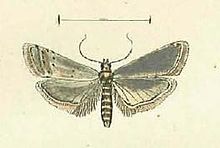Homoeosoma nimbella
| Homoeosoma nimbella | |
|---|---|

| |

| |
| Scientific classification | |
| Domain: | Eukaryota |
| Kingdom: | Animalia |
| Phylum: | Arthropoda |
| Class: | Insecta |
| Order: | Lepidoptera |
| Family: | Pyralidae |
| Genus: | Homoeosoma |
| Species: | H. nimbella
|
| Binomial name | |
| Homoeosoma nimbella | |
| Synonyms | |
| |
Homoeosoma nimbella is a moth of the family Pyralidae. It is found in Europe.
The wingspan is 16–21 mm. The forewings are light ochreous, sometimes greyish-tinged, more or less sprinkled with dark fuscous, towards costa more or less broadly suffused with white; first line indicated by an angulated oblique series of three blackish dots, second straight, almost obsolete, hardly dark-edged; two blackish transversely placed discal dots. Hindwings pale fuscous. Larva yellowish-green;dorsal line, subdorsal series of spots or rings, and spiracular series of three marks on each segment purplish; head dark brown; plate of 2 yellow-brown, posterior edge black: in flowers of Anthemis, Jasione, Senecio, etc.[2][3][4][5]
The moths are on wing from May to August depending on the location.

The larvae probably feed on the flowers or fruit of Asteraceae species.
References
[edit]- ^ "GlobIZ search". Global Information System on Pyraloidea. Retrieved 2011-10-07.
- ^ Meyrick, E., 1895 A Handbook of British Lepidoptera MacMillan, London pdf
 This article incorporates text from this source, which is in the public domain. Keys and description
This article incorporates text from this source, which is in the public domain. Keys and description
- ^ lepiforum.de includes images
 This article incorporates text from this source, which is in the public domain.
This article incorporates text from this source, which is in the public domain.
- ^ Parsons, M. Clancey, C. 2023 A Guide to the Pyralid and Crambid Moths of Britain and Ireland Atropos Publishing ISBN 9780955108648
- ^ Goater, B., Dyke . G. and Tweedie, R. 1986 British Pyralid Moths: A Guide to Their Identification ISBN 10: 0946589089 ISBN 13: 9780946589081
External links
[edit]
